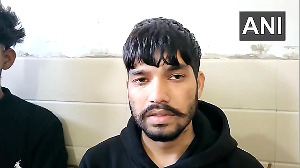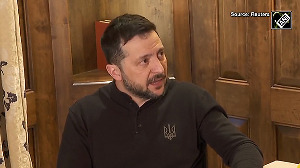Togo's soccer team flew home on Sunday after the deadly ambush of their team bus but the sports minister said they hoped to return to Angola, where Africa's biggest sports tournament got underway.
Though overshadowed by the deaths of a Togo squad coach and a press officer in Friday's gun attack in Cabinda, the African Nations Cup began as planned in a 50,000-seat stadium in the Angolan capital Luanda.
A spectacular fireworks display lit up the purpose-built stadium, whose rims bend like the horns of the black sable antelope - Angola's national symbol.
Soccer fans observed a minute of silence as a sign of respect for the Togolese and their driver, who was killed at the scene, before hosts Angola and Mali kicked off the tournament.
Togo's players and head coach, though shocked by the attack, said they would remain in the competition to honour the dead, but their prime minister ordered the team home and sent a plane to bring them back.
It would be wrong to let the team stay and take part, Togo's Prime Minister Gilbert Houngbo said.
"Anybody that is involved in security matters will tell you that it would be irresponsible to just pretend that nothing has happened and just let the show go on," he told the BBC World Service. "Security is non-negotiable."
Togo striker and captain Emmanuel Adebayor told reporters at Cabinda airport: "We have to mourn our dead, we're going back to do so, that's life and we're obviously very sad."
Togolese Sports Minister Christophe Tchao added to the uncertainty by telling reporters in Cabinda that Togo had asked the Confederation of African Football (CAF) to find a way for the team to rejoin the competition later.
"We have ordered a three-day mourning," Tchao said. "The players are leaving with the bodies of their fallen brothers and we have asked the CAF to find an arrangement so we can catch up with the competition later."
Team media officer Stanislas Ocloo, assistant coach Amalete Abalo and a driver were killed when gunmen from the Front for the Liberation of the Enclave of Cabinda fired on the team bus in Cabinda, an enclave separated from the rest of Angola.
Seven people were wounded including reserve goalkeeper Kodjovi Obilale, now in stable condition in a South African hospital after surgery.
INSURGENTS
Friday's ambush shows how easily insurgents can grab world headlines with attacks on soft targets and raises questions about security for the soccer World Cup in South Africa in June, but South African President Jacob Zuma dismissed any comparison.
The attack by a separatist group Angola's government recently said no longer existed cast a shadow over an event supposed to show Angola at peace after years of civil war.
Angola has spent $1 billion building stadiums, roads and hotels for the competition, which brings together Africa's best national teams. The biennial tournament, which lasts until Jan. 31, will be broadcast live around the world.
Cabinda, the scene of rebel FLEC attacks even after Angola's 27-year civil war ended in 2002, provides half the oil output of the country, which rivals Nigeria as Africa's biggest producer.
South Africa's Zuma, who attended the opening ceremony, stressed on arrival that his country remained 100 percent ready to host the World Cup, and said the Angolan attack had no bearing on the tournament in South Africa.
It was the second militant attack on a sports team in a year. In March, six policemen and a driver died when gunmen attacked a bus carrying Sri Lanka's cricket team in Pakistan.
Despite South African assurances, security analysts said outsiders involved in June's World Cup are unlikely to ignore the Angolan attack and will want to review security.
South Africa is the first African nation to hold the world's biggest single-sport event.











 © 2025
© 2025